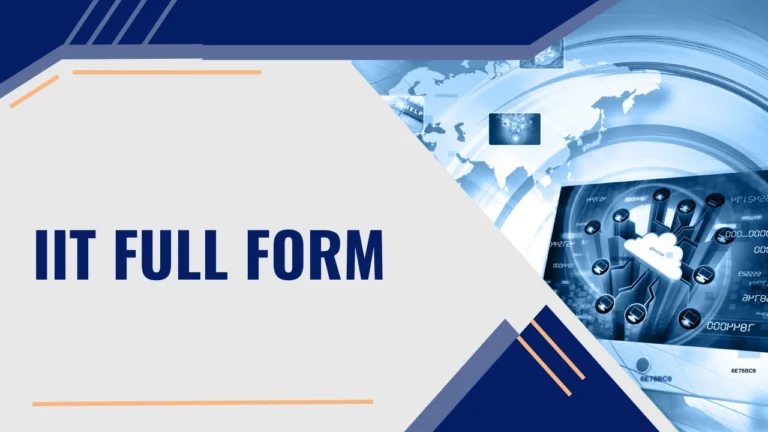ITI Full Form in Technical Education and Other Fields 2025

When you think about technical education in India, the ITI full form often comes to mind. Just like the MSVP Full Form is used in medical or administrative fields, ITI form stands for Industrial Training Institute. These institutes are a backbone of India’s skill development mission. They prepare students for hands-on careers in various technical and non-technical fields.
The purpose of ITI is to make youth skilled, independent, and job-ready without the need for long academic degrees. This article explores everything you should know about the ITI form, its meaning, benefits, courses, eligibility, and job opportunities.
| Aspect | Details |
|---|---|
| Full Form | Industrial Training Institute (ITI) |
| Field Type | Vocational and Technical Education |
| Purpose | To make youth skilled, independent, and job-ready for industrial and service sectors |
| Focus Area | Practical, hands-on training in technical and non-technical trades |
| Duration of Courses | 6 months to 2 years, depending on trade |
| Eligibility | Minimum 8th or 10th pass, age 14 years and above |
ITI Full Form in Electrical and Electronics Field
One of the most popular streams in ITI is the Electrical and Electronics field. Students learn how to install, repair, and maintain electrical systems.
Trades like Electrician, Wireman, and Electronics Mechanic come under this category. After completing training, students can work in factories, maintenance companies, or start their own electrical business.
This field has high demand as industries and households always need qualified electricians.
ITI Form in Automobile and Motor Vehicle Field
The Automobile trade teaches students to repair, maintain, and assemble vehicles. ITIs offer trades like Mechanic (Motor Vehicle), Diesel Mechanic, and Automobile Electrician.
Graduates can find jobs in automobile service centers, car manufacturing companies, or open their own repair garages. With the growing number of vehicles in India, this field promises a bright future.
ITI Form in Computer and Information Technology Field
Modern ITIs also offer training in Computer Operator and Programming Assistant (COPA), Data Entry, and Information Technology trades.
Students learn basic coding, software usage, and digital office tools. This ITI stream opens doors to jobs in offices, IT support, and government data management.
It is ideal for students who want to work in technology but prefer short, skill-based training instead of long academic degrees.
ITI Form in Agriculture and Rural Development Field
Some ITIs provide training in agriculture-related trades like Farm Equipment Maintenance, Tractor Mechanic, and Dairy Production.
These trades are important for rural India, where most people depend on farming. Students learn how to use machines, maintain farm tools, and handle irrigation systems.
Graduates can work in agricultural companies or serve as skilled technicians in rural development projects.
ITI Full Form in Health and Paramedical Field

While not as common as other trades, some ITIs now offer paramedical and health-support courses. These include trades like Health Sanitary Inspector and Basic Nursing Assistant.
Such training helps students find jobs in hospitals, clinics, and public health departments. This is where terms like DMO Full Form (District Medical Officer) connect to ITI indirectly through health and technical support work.
Types of ITI Courses
ITI offers two main types of courses — Engineering and Non-Engineering. Both have different skill requirements, but they serve the same purpose: preparing students for practical work.
| Category | Examples of Trades | Duration |
|---|---|---|
| Engineering Trades | Electrician, Fitter, Mechanic, Turner, Welder | 1–2 years |
| Non-Engineering Trades | Hair & Skin Care, Sewing Technology, Fashion Design, Stenography | 6 months – 1 year |
Engineering trades involve technical subjects, while non-engineering ones focus on services and creativity. Both types provide certifications that are nationally recognized.
Duration of ITI Courses
The duration of ITI courses depends on the trade. Most courses last between 6 months to 2 years. Short-term courses train students for smaller technical jobs, while longer courses prepare them for specialized industrial roles.
After completing the course, students must appear for the All India Trade Test (AITT). Successful candidates receive the National Trade Certificate (NTC), which helps them get recognized jobs in government and private sectors.
Eligibility Criteria for ITI Admission
Before applying to ITI, it’s important to understand the eligibility requirements.
- The applicant should have passed at least Class 10 from a recognized board.
- Some trades also allow students who have passed Class 8.
- The minimum age limit is 14 years, and the maximum age limit is usually 40 years.
- Admission is mostly based on merit, though some states conduct entrance tests.
These flexible eligibility conditions make ITI one of the best options for early career starters.
Admission Process for ITI
Admission to ITI courses is straightforward. Students can apply online or offline through the official state websites. Once applications are submitted, seats are allotted based on merit or entrance exam results.
After selection, students must complete the document verification and pay the course fees. Some private ITIs offer direct admission based on school marks.
Popular ITI Trades in India
There are hundreds of trades available across India’s ITIs. Some of the most popular ones include:
| Engineering Trades | Non-Engineering Trades |
|---|---|
| Electrician | Hair & Skin Care |
| Fitter | Stenographer |
| Mechanic (Motor Vehicle) | Fashion Design |
| Turner | Sewing Technology |
| Welder | Health Sanitary Inspector |
Each of these trades offers strong job opportunities, both in India and abroad.
Benefits of Studying in ITI
Studying in an ITI has many advantages, especially for students who want to enter the workforce early.
First, ITI training focuses on practical learning. This ensures that students are confident when they enter real jobs. Second, the course duration is short, allowing faster entry into the job market. Third, ITI graduates are eligible for apprenticeships under government schemes, which further increase their experience.
Lastly, ITI education is affordable, making it accessible to students from all backgrounds. This is one reason why the ITI form stands as a symbol of opportunity and empowerment.
Difference Between ITI and Polytechnic
Many people confuse ITI with Polytechnic courses, but they are different in purpose and structure.
| Aspect | ITI | Polytechnic |
|---|---|---|
| Full Form | Industrial Training Institute | Polytechnic Diploma Institute |
| Duration | 6 months – 2 years | 3 years |
| Eligibility | 8th or 10th pass | 10th pass |
| Focus | Practical skills | Technical theory |
| Outcome | Job-ready training | Pathway to engineering |
Both are useful, but ITI focuses more on hands-on industrial training, while Polytechnic focuses on academic and theoretical learning.
ITI in the Modern World
In today’s technology-driven world, ITIs are evolving to include new trades related to automation, robotics, and computer skills. This modernization ensures students remain relevant in the global market.
Many ITIs now have partnerships with private companies to give students on-the-job training. Some even have advanced labs where students can learn how to work with modern equipment.
This transformation is helping ITIs produce industry-ready professionals who can adapt to any working environment.
Job Opportunities After ITI
After completing an ITI course, students have several career options. They can work in private companies, public sector organizations, or even start their own workshops.
Private industries such as automobile, construction, maintenance, and electronics also hire ITI-trained professionals. Those who prefer to continue studying can join diploma or advanced technical programs later.
The DMO Full Form may stand for District Medical Officer in a different context, but within ITI education, the focus is on technical roles. ITI graduates become electricians, fitters, mechanics, and service technicians who are vital to every sector.
Earnings and Growth After ITI
The salary after ITI depends on trade, skill, and experience. On average, fresh ITI graduates earn between ₹10,000 and ₹25,000 per month. With experience, this can go beyond ₹40,000, especially in industries like automobile and electrical maintenance.
ITI certificate holders can also start their own business, such as workshops, repair shops, or service agencies. Some become trainers in private institutes after gaining years of experience.
Government Support and Skill Programs
The Indian government supports ITI through schemes like Skill India, Pradhan Mantri Kaushal Vikas Yojana (PMKVY), and National Apprenticeship Promotion Scheme (NAPS).
These programs help improve infrastructure, update training methods, and connect students with employers. The goal is to make ITI graduates more employable both in India and abroad.
Such initiatives ensure that the ITI full form continues to represent opportunity and practical education for millions of youth.
Challenges Faced by ITI Sector
Despite its benefits, ITI faces several challenges. Some institutes lack modern equipment or updated course content. In rural areas, awareness about ITI’s importance is still low.
However, new government projects aim to fix these problems. Modern ITIs are being equipped with smart classrooms, digital learning tools, and industry collaborations. These steps help bring ITI training closer to global standards.
Conclusion
To summarize, the ITI full form stands for Industrial Training Institute, a vital part of India’s skill development network. It provides short-term, affordable, and job-oriented education to lakhs of students every year.
ITI focuses on practical training instead of theory, helping students become self-reliant and employable. Whether you aim to work in the private sector, government sector, or start your own business, ITI training can be your foundation.
So the next time you hear someone ask “what is the ITI form?”, you can proudly say it means Industrial Training Institute — a name that stands for skill, success, and opportunity.





